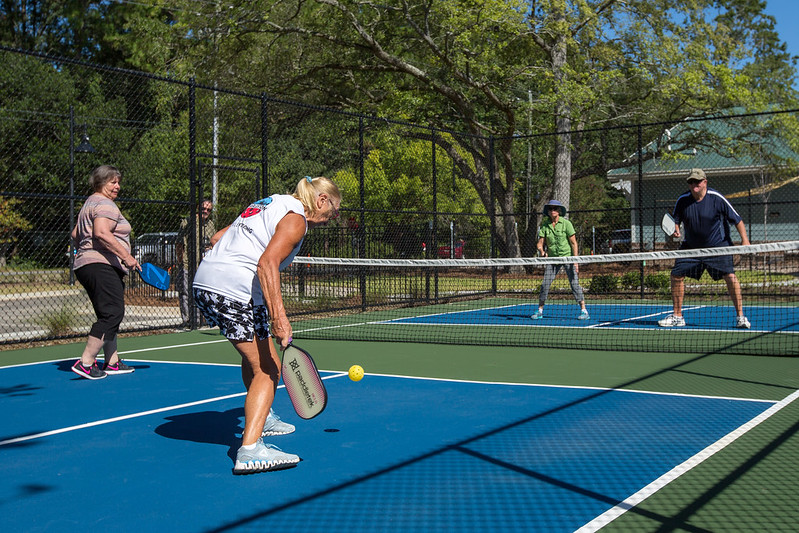|
As you age, being physically active can help you stay strong and healthy enough to continue doing the things you enjoy. Often, inactivity is more to blame than age when older people lose the ability to do things on their own. That’s why experts say older adults should engage in physical activities throughout the week to maintain their health. Regular physical activities can improve your mood, reduce depression, reduce stress, increase energy and improve sleep. Regular exercise and physical activity can also reduce the risk of developing some diseases and disabilities such as heart disease, diabetes, arthritis, high blood pressure, balance problems and difficulty walking. Regardless of health and physical abilities, older adults can gain a lot by staying physically active.
Many physical activities can be done for free and do not require any special equipment. A brisk walk, basic stretches or yard work can all be beneficial when done regularly. You could also try a workout video on YouTube or try contacting your local senior center, or parks and recreation department about facilities and programs in your area. According to Harvard Medical School the 4 most important types of exercise are aerobics, stretching, strengthening, and balance exercises. Each type of exercise has different benefits and the variety helps reduce boredom and risk of injury. Aerobic exercise or “cardio” is a type of workout where your heart rate and breathing increase, but not so much that you feel like you need to stop and rest. These activities help keep you healthy, improve overall fitness, and help you perform the tasks you need to do every day. Aerobic exercises improve the health of your heart, lungs and circulatory system. Some examples include brisk walking, yard work, dancing, jogging, swimming, biking, hiking, tennis and basketball. Stretching will improve your flexibility. Moving more freely will make it easier for you to reach down to tie your shoes or look over your shoulder when you back up your car. Improved flexibility will also reduce your risk of injury while participating in other exercises or everyday physical activities. Most stretches can be done without any equipment and with minimal space. Perform each stretch for about 10 to 30 seconds and repeat three times. As you stretch, breathe deeply, and go slowly. Never force a movement that causes pain. It’s okay if you can’t bend very far initially, use good form and with regular stretching, your flexibility will improve. Strength training is one of the best ways to keep muscles healthy and strong. Regular strength training builds bone and muscle and helps to reduce weakness and frailty that can come with age. Your muscular strength can make a big difference for tasks such as getting up from a chair by yourself, lifting your grandchildren, and walking through a park. Keeping your muscles strong can also help with your balance and prevent falls. You are less likely to fall when your leg and hip muscles are strong. Body weight exercises are often the best exercises to start with to ensure proper form and safety. Weights or resistance bands can be added to any routine for more advanced users. Balance exercises help prevent falls, a common problem in older adults that can have serious consequences. Many factors that aid us in maintaining balance such as vision, sensory organs in the inner ear, leg muscles and joints can deteriorate as we age however, balance exercises can counteract these issues. Many senior centers and gyms offer balance-focused exercise classes, such as tai chi or yoga. Balance exercises are especially important if you've had a fall. Typical balance exercises include standing on one foot or walking heel to toe. Working on joint flexibility and strengthening leg muscles will aid considerably with balance as well. Always be sure to get the proper training before attempting any of these exercises at home and remember to consult your doctor before embarking on any exercise regimen. If you find yourself caring for an aging parent you may find yourself in a position where important legal, medical or financial matters will need your attention. In order to carry out the wishes of your loved one you will need a power of attorney. A power of attorney allows a person to name an agent who will make important decisions on your behalf.
The person who gives the authority is called the principal, and the person who has the authority to act for the principal is called the agent. You can designate both a financial power of attorney and a medical power of attorney. A medical power of attorney and a financial power of attorney are typically created in separate legal documents. A power of attorney can take effect immediately, or upon a defined future event such as incapacitation due to an accident. If the power of attorney is effective immediately, it can be used even if you are not incapacitated. If its powers are limited to certain events they don't go into effect until a such an event has occurred. The most common event is the incapacity of the principal. Incapacity only occurs when the principal is certified by one or more physicians unable to make decisions. Incapacity can be due to mental illness, Alzheimer’s disease, being in a coma, or being otherwise unable to communicate. If it never becomes necessary, your agent may never use a power of attorney. A general power of attorney ends the moment you become incapacitated. A durable power of attorney allows an agent’s authority to continue in the event you become incapacitated. There is no automatic deadline by which these powers expire. A durable power of attorney stays in effect until the principle dies or until they act to revoke the power they’ve granted to their agent. In most instances when preparing advance directives a durable power of attorney is advisable so that the agent can act in the event the principal is incapacitated. Who should you choose to act as your power of attorney? Most people choose their spouse, a relative, or a trusted friend to act as their power of attorney however you can designate anyone you want. Choosing a power of attorney is not about choosing the person you feel closest with. The person you choose should be someone who will represent your wishes as you have defined them. While your power of attorney may not agree with everything you want, it is critical that they are willing to follow through with your wishes even though they disagree with those choices. If you feel pressured to change your opinions, this is a sign that the person may not be the best representative for you. Finding someone who is willing to respect your wishes above their own is of the upmost importance and will provide peace of mind knowing your affairs will be handled in the way you choose. Assume you are in the hospital, unconscious and near death. There is a chance that modern medicine could bring you back to life if your heart is restarted within minutes of your collapse, but it requires somebody stepping up to make decisions on your behalf. What do you wish to happen? Do you want a loved one, or somebody to decide what happens next? Would you like to have a say in how the doctors and your family handle such decisions? If so, you need to understand advance directives including a living will, POLST, DNR, power of attorney and durable power of attorney. By planning ahead, you can choose the medical care you want and take the burden off loved ones during moments of crisis or grief. Advance directives Advance directives are legal documents that allow you to spell out your decisions about end-of-life care ahead of time. They give you a way to tell your wishes to family, friends, and health care professionals and to avoid confusion later on. Living will A living will is a written, legal document that spells out medical treatments you would and would not want to be used to keep you alive, as well as your preferences for other medical decisions, such as pain management or organ donation. POLST Forms POLST forms provide guidance about your medical care preferences in the form of a doctor’s orders. Typically, you create a POLST (Physician Orders for Life-Sustaining Treatment) when you are near the end of life or critically ill and know the specific decisions that might need to be made on your behalf. These forms serve as a medical order in addition to your advance directive. They make it possible for you to provide guidance that healthcare professionals can act on immediately in an emergency. DNR A DNR (do not resuscitate) order tells medical staff in a hospital or nursing facility that you do not want them to try to return your heart to a normal rhythm if it stops or is beating unsustainably using CPR or other life-support measures. Even though a living will might say CPR is not wanted, it is helpful to have a DNR order as part of your medical file if you go to a hospital. Without a DNR order, medical staff will make every effort to restore your breathing and the normal rhythm of your heart. Power of Attorney A power of attorney is a document you can use to appoint someone to make decisions on your behalf. The appointment can be effective immediately or can become effective only if you are unable to make decisions on your own. General Power Of Attorney A general power of attorney lets you give someone else the authority to act on your behalf, but this power will end if you are unable to make your own decisions. Durable Power Of Attorney A Durable power of attorney allows you to name someone to act on your behalf for any legal task, but it stays in place if you become unable to make your own decisions. Power of Attorney for Health Care A durable power of attorney for health care is a legal document naming a healthcare proxy, someone to make medical decisions for you at times when you are unable to do so. Your proxy, also known as a representative, surrogate, or agent, should be familiar with your values and wishes so he or she will be able to decide as you would when treatment decisions need to be made. Choosing a Medical Agent Think about who you trust to tell the doctors about what is most important to you and what you would want if you become too sick to tell them yourself. You want to choose someone who will follow your medical wishes, make sure your wishes are known to medical providers and is able to make decisions in situations that may be extremely stressful. What to Discuss With Your Medical Agent
Advance directives need to be in writing and each state has different forms and requirements for creating legal documents. Depending on where you live, a form may need to be signed by a witness or notarized. |
AuthorTyice Strahl Categories
All
Archives
May 2023
|
- Home
-
Settings
- Assisted Living
- Home Care
- Independent Living
- Memory Care
- Skilled Nursing
- Adult Family Homes
-
All Communities
>
- Aspen Quality Care
- Avamere South Hill
- Brighton Court
- Brookdale Nine Mile
- Brookdale Park Place
- Cheney Assisted Living
- Cherrywood Assisted Living
- Colonial Court
- Cornerstone Court
- Evergreen Fountains
- Palouse Country
- Fairview Assisted Living
- Fairwinds
- Fairwood
- Fieldstone Memory Care
- Good Samaritan
- Maplewood Gardens
- Moran Vista
- North Point Village
- Orchard Crest
- Pine Ridge Memory Care
- Emilie Court
- Ridgeview Place
- Riverview Retirement
- Rockwood Retirement Community
- Rose Pointe Assisted Living
- Royal Park
- South Hill Village
- Sullivan Park Assisted Living
- Sunshine Health Facilities
- Touchmark Assisted Living
- Willow Grove
- Wind River
- Alderwood Manor
- Franklin Hills
- Manor Care
- North Central Care Center
- Providence St Joseph
- Regency at Northpointe
- Royal Park Health and Rehabilitation
- Spokane Veterans Home
- The Gardens on University
- Spokane Assisted Living Directory
- Locations
- Services
- About
- Senior Living Blog
- Contact




 RSS Feed
RSS Feed
